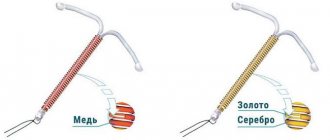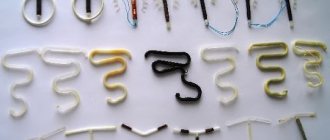The IUD is an effective method of contraception
This tool is considered one of the most reliable. It protects against unplanned conception by 95%. In addition, the presence of the IUD is not felt by the woman in any way and does not cause discomfort. Moreover, this method works for a long time. However, before using this method of contraception, many are interested in the question of whether the IUD can be installed in nulliparous girls and whether there are contraindications to installing the device. It is known that IUDs are used mainly by women who already have children. However, some representatives of the fairer sex, who have not yet experienced the happiness of motherhood, consider this remedy as a way to protect against unplanned pregnancy.
When to place after childbirth
When can I get the IUD after the baby is born and is it possible to get the IUD after childbirth at all? In a minimum of 48 hours. But the optimal time for such an operation is after 21 days. You should first make sure that you do not have inflammation or sexually transmitted diseases.
When to place it after surgery? The procedure is carried out 3-4 months after birth to avoid suture dehiscence, inflammation and other complications. After an abortion, the IUD can be inserted immediately after curettage. In all cases, no pain is felt during installation.
Features of the action
An intrauterine device is a small device made of silver, gold or copper.
It is placed in the uterine cavity. The drug prevents the passage of sperm into this organ. If conception does occur, the IUD does not allow the fertilized egg to attach, and during menstrual periods it is rejected along with menstrual blood.
Before installing this device, you must undergo a gynecological examination and laboratory tests. These studies will help exclude various pathologies. If infections are detected, the woman should first undergo therapy and then use this method of contraception. Typically, IUDs are used by the following categories of patients:
- Girls with high fertility.
- Women who are not ready to conceive within a certain period of time.
- Representatives of the fairer sex with pathologies in which pregnancy is contraindicated.
- The partner has diseases that are potentially dangerous to the embryo.
Is it possible to insert the IUD into nulliparous girls? Is the absence of children a contraindication to the use of the product?
Is there a IUD for nulliparous women?
Photo: Girl at a gynecologist's appointment
In fact, in their practice, many gynecologists recommend and place an intrauterine device for nulliparous women, because this method of contraception is convenient, reliable, reversible and cost-effective. And, as practice has shown, complications do not always occur. The woman makes the choice, and the doctor is obliged to warn her about the possible risks.
One of the recommended IUDs is a hormonal intrauterine system called Mirena, which is reliable in terms of contraception and has therapeutic and prophylactic properties, destroying all barriers to the use of IUDs by nulliparous girls.
Important! Mirena can only be given to nulliparous women who have one permanent partner and do not plan to have children in the near future.
The contraceptive effect of the Mirena hormone-releasing system lasts for 5 years. The reliability of the IUD is often compared to female sterilization, but unlike it, the contraceptive effect of the Mirena IUD is completely and quickly reversible. Fertility is restored on average 30 days after removal of the system.
WHO experts say that a nulliparous girl with ideal gynecological health and a complete examination can have a mini-device (a type of intrauterine device) with copper, silver or gold installed. But only under the following conditions:
- if this category of women cannot use other types of contraception;
- has one sexual partner;
- the likelihood of contracting sexually transmitted diseases is minimal;
- does not have chronic inflammatory processes of the pelvic organs.
Thus, IUDs can be recommended for nulliparous women in cases where other types of contraception are contraindicated or unsuitable.
In what cases should an IUD not be used?
This method of contraception is undesirable in the presence of the following conditions:
- The presence of symptoms indicating pregnancy.
- Suspicions of cancer pathologies or benign tumors of the reproductive organs.
- Bleeding of unknown origin.
- Tubal pregnancy.
- Pathological processes in the area of the uterus and other organs of the reproductive system.
- Severe form of anemia.
- Individual intolerance to metals.
- Congenital defects of the uterus.
- Pathologies of the cervical canal.
The absence of children is not a contraindication to the use of an IUD. However, experts do not give a clear answer to the question of whether it is possible to install the IUD in nulliparous girls. Today, many doctors do not recommend this method of contraception for this category of patients.
How to install a spiral
Only a doctor can install any type of spiral, and the same can remove it. Therefore, you cannot do without consulting a specialist who will help you choose a product (with copper or hormones) and decide on the installation.
This is usually a simple procedure, but an extremely rare complication is uterine perforation INTRAUTERINE DEVICES. Sometimes the spiral may fall out. Therefore, in the first three months you need to regularly visit the gynecologist; the doctor himself will prescribe a schedule.
fancy.tapis.gmail.com/Depositphotos.com
After installation, the spiral is not felt, only two short antennae are released from the cervical canal (from the cervix). These are Intrauterine Device (IUD) threads that help make sure the IUD is in place. Subsequently, they will help the gynecologist remove the IUD.
These same mustaches do not interfere in everyday life, including during sex.
Sometimes after installation a woman may feel discomfort and dizziness, but they pass quite quickly. The procedure itself is not very pleasant, but not much worse than a regular examination by a gynecologist.
Main reasons
Why is it undesirable for girls who do not have children to use an IUD as a method of protection against unwanted conception? Firstly, such patients have a high probability of developing complications, for example, damage to the uterine cavity or its cervix.
This consequence often leads to infertility. In addition, there is a risk of the device being rejected by the body.
Other complications
When asked whether it is possible to place an intrauterine device in nulliparous girls, many experts give a negative answer. The IUD is used only when most methods of protection against unwanted conception are not suitable for the patient. The likelihood of complications is higher in women with irregular cycles or chronic pathologies of the reproductive system. This device may adversely affect the reproductive health of the fairer sex. If the IUD is used by nulliparous women, the consequences are as follows:
- The occurrence of discomfort in the lower part of the peritoneum.
- Bleeding of varying intensity.
- Inflammatory processes in the organs of the reproductive system. Such ailments can become chronic.
- High risk of tubal pregnancy.
- Thinning of the inner layer of the uterus.
- Inability to conceive and bear a fetus.
Taking into account this information, the answer to the question of whether it is possible to place an IUD in nulliparous women is more likely negative than positive. Of course, every girl has the right to independently choose a method of protection against unplanned pregnancy. However, today there is a large selection of contraceptive methods.
Many of them do not lead to such serious complications.
Minuses
But still, the IUD is not a panacea; its functions are limited to the destruction of sperm. Some women may experience pain in the lower abdomen or lower back after installing the device. In addition, periods may become more heavy and painful. And in the first 10-15 days, the mechanism can provoke minor bleeding.
This type of protection does not protect against sexually transmitted infections at all.
Moreover, if this device is located in the uterus, then it seems to open it slightly, thereby increasing the likelihood of harmful bacteria entering the body. If you become infected with sexually transmitted diseases while wearing it, the disease will manifest itself in a more complex form. In addition, there are cases when the contraceptive itself fell out of the uterus.
Read also Prayer after childbirth: cleansing, permissive, about health
Experts' opinions
Is it possible to insert the IUD into nulliparous girls?
Reviews from gynecologists on this issue are quite contradictory. Some doctors believe that for this category of patients the use of an IUD is absolutely unacceptable. Other experts believe that the spiral will not harm the body of a nulliparous girl if, before installing the device, she undergoes all the necessary examinations (laboratory tests of biomaterials, ultrasound of the reproductive organs). This contraceptive is used only in the absence of infectious processes, inflammation and numerous abortions in the past. In addition, sometimes representatives of the fairer sex who do not have children have thinned uterine tissue. Such patients run the risk of damage to the organ cavity during installation of the IUD.
Even for those women who do not experience serious health problems, the use of this method of contraception can cause serious consequences. Complications often lead to prolonged inflammatory processes. Such pathologies are undesirable for a girl if she plans to become a mother in the future. However, in medical practice there are many cases where an IUD was installed in nulliparous representatives of the fairer sex, and the patient’s body tolerated this drug normally. But still, the question of whether it is possible to install a spiral in nulliparous girls cannot be given a positive answer. After all, a woman who uses this method of protection against unwanted conception risks facing the problem of infertility.
Is it possible for nulliparous women to have the IUD?
As a rule, in most cases gynecologists refuse a woman’s request to install an IUD before childbirth. But this is not due to the difficulty of inserting an IUD, but to undesirable consequences that can affect the reproductive function of a nulliparous woman. Most experts say that an intrauterine device for nulliparous women can be placed if other means of contraception are not suitable (which is extremely rare) and only after the necessary examination. And even the installation of an IUD by an experienced professional doctor does not guarantee that there will be no complications.









